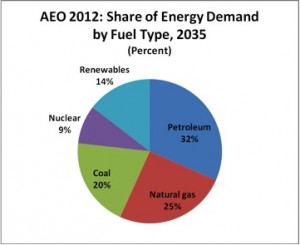January 15, 2014 – At least when it comes to oil it seems consumption is starting to decline among the countries of the Developed World. So states Christof Ruehl, Chief Economist at BP, the much beleaguered energy producer.
Ruehl points out that consumption among countries in the European Union today is at 1967 levels, and for all OECD countries, 2012 consumption equals that of 1995. And although demand is rising in the Developing World less involves oil. Instead natural gas is becoming the fuel of choice, gaining ground on both oil and coal.
According to Ruehl by 2035 our fossil fuel energy mix will be far different from today with oil, coal and natural gas consumption roughly equal. And Ruehl forecasts that Developed World economies will actually use less energy in 2030 than they do today.
What is driving these changes? Here are Ruehl’s insights:
- Industry is using less energy to produce units of production measured in GDP dollars.
- Energy intensity per unit continues to decline driven by the 21st century economy which is less manufacturing intensive in the Developed World, and more oriented to services.
- Increased global trade is a contributing factor as well, as are policies to regulate improvements to fuel efficiency.
- And finally industrial players are taking on the threat of climate change more seriously and sometimes well ahead of the governments under which they operate, although government emission regulation is starting to make a dent in CO2 output.
Ruehl cites U.S. data pointing to declining emissions, falling to 1995 levels as the American economy switches off coal and replaces it with shale gas, and as new vehicle models become standard fare on American roads.
In his concluding remarks in an article in The Financial Times, he states, “the relentless improvements in energy intensity …. are the main driver of slower emissions growth – without them, emissions in our 2035 projection would be more than 40 per cent higher ….. any substantial change in our energy mix towards lower carbon fuels requires price signals – the same mechanism that drives the relentless improvements in energy efficiency. Without it, the carbon content of the energy the world burns will remain the accidental consequence of other influences.”
These are interesting observations coming from a senior executive at BP and may point to a sea change in our search for a green and sustainable future.














